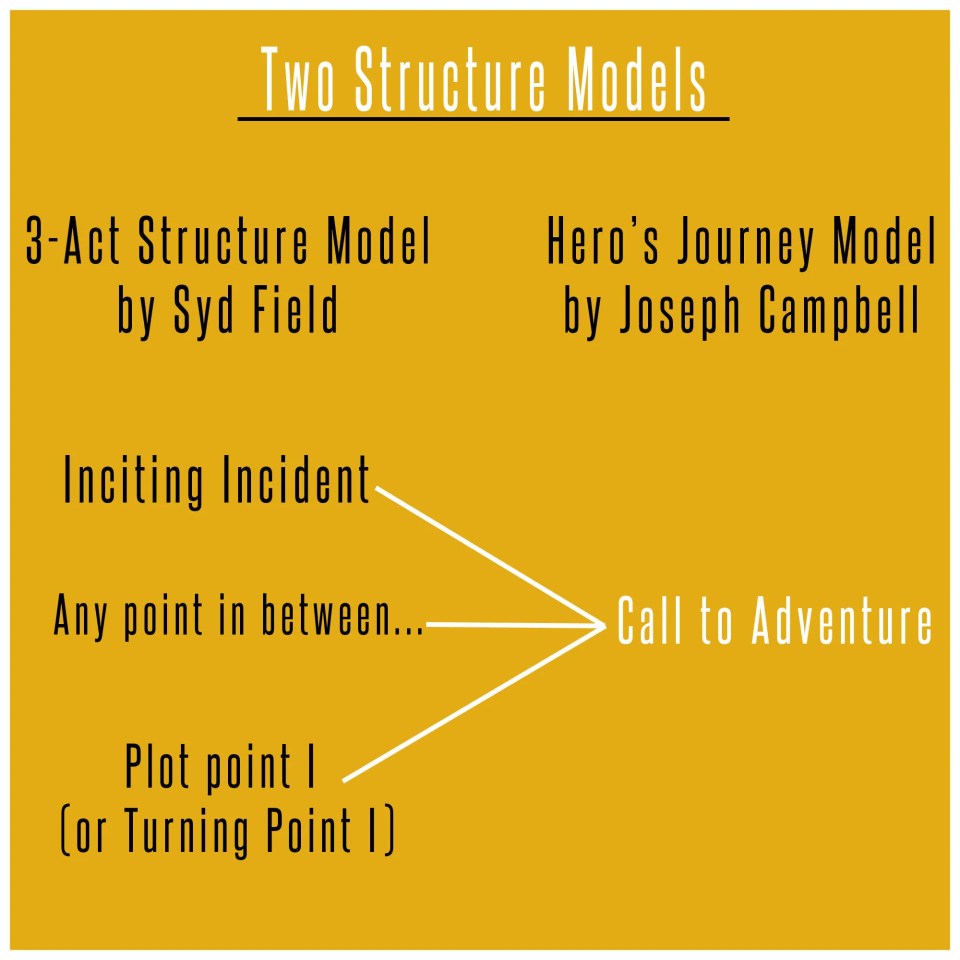
Call to Adventure and Inciting Incident: NOT the Same Thing
So many people in the industry mention the Inciting Incident and the Call to Adventure as if they were the exact same thing… which results in a lot of confusion regarding in which scene one can find the one or the other. In this article, I’m going to explain what’s the matter with this confusion and why the two of them are NOT the same thing.

First of all, it is very important to make clear that the confusion between them is because we’re comparing things from two different structure models. Apples and oranges.
The inciting incident is suggested by the “3-Act Structure Model” by Syd Field, whereas the call to adventure is suggested by the “Hero’s journey model” by Joseph Campbell.
Because the 3-Act Structure Model is quite minimal (or quite “empty”) a lot of screenwriters are trying to enhance it by adding plot points from other models. Which is a good thought. However, these attempts of combining the two aforementioned models have led to this tangle.
According to Syd Field, the inciting incident is the event or incident that triggers everything. It’s when it all starts.
It doesn’t have to be something that is happening to the protagonists, it’s something that just happens. Sooner or later, it will affect the protagonists, however, it’s not necessarily something that happens TO them or that affects them immediately.
On the other hand, the Call to Adventure is suggested by Joseph Campbell in the Hero’s Journey and it is something personal. It definitely affects the protagonist immediately. It’s a call. It’s the protagonist’s call to start an adventure, a journey.
Film examples
Where the Call to Adventure is the same with the Inciting Incident
Yes, sometimes the two plot points are the same event: (That’s the case in the Hunger Games) but other times there are two different events.

In Hunger Games, the inciting incident and the call to adventure is the same scene. That’s because the lottery drawing is Katniss’s sister’s name (inciting incident). Katniss is there, hears about it, and has to take action immediately (that’s her call to adventure).
However, in many stories and films, the Call to Adventure might be in a different scene from the inciting incident. It comes later or even when the Plot Point of Act 1 is.
Again, we must underline here that the Plot point of Act 1 is a plot point of the 3-Act Structure Model.
Where the Call to Adventure is NOT the same with the Inciting Incident
Let’s see an example now where the call to adventure and the inciting incident are two separate events.

In Jurassic Park, the event that started everything is that a creature killed a worker. This is happening at the very beginning of the story and it is the inciting incident. That’s because that event triggers the investors to demand certification that the Park is safe.
This leads to Hammond later asking Dr. Alan and Dr. Ellie for their certification. This is the actual Call to Adventure for the two protagonists because now they are invited to visit the park. That’s their call into action. However, this is not the event that started it all. It’s just the event that had the two protagonists moving. And in the 3-act-structure model, this is also the Plot Point of Act 1.
According to the “Hero’s Journey model”, after the protagonists receive the call to adventure, very often they have second thoughts. They usually wonder whether to accept the call or not. And many receive help from a mentor at this point.
In some cases, the Call to Adventure comes really late in the story, as late as Plot Point I. In these cases, usually, the protagonists accept the call immediately. They’re not having second thoughts, nor the need of a mentor. On the contrary, they move to Act 2 as soon as possible!
If you rather watching videos, you can watch this:






2 Comments
M. Richards
I think the second paragraph title of “Where the Call to Adventure is the same with the Inciting Incident” is missing the word “not”. It headlines the paragraph for the Jurassic Park example of the Inciting Incident being different from the Call.
Helpful article. Thanks for writing it.
Apollonia Tsanta
Thank you very much for noticing that! I fixed it now 🙂